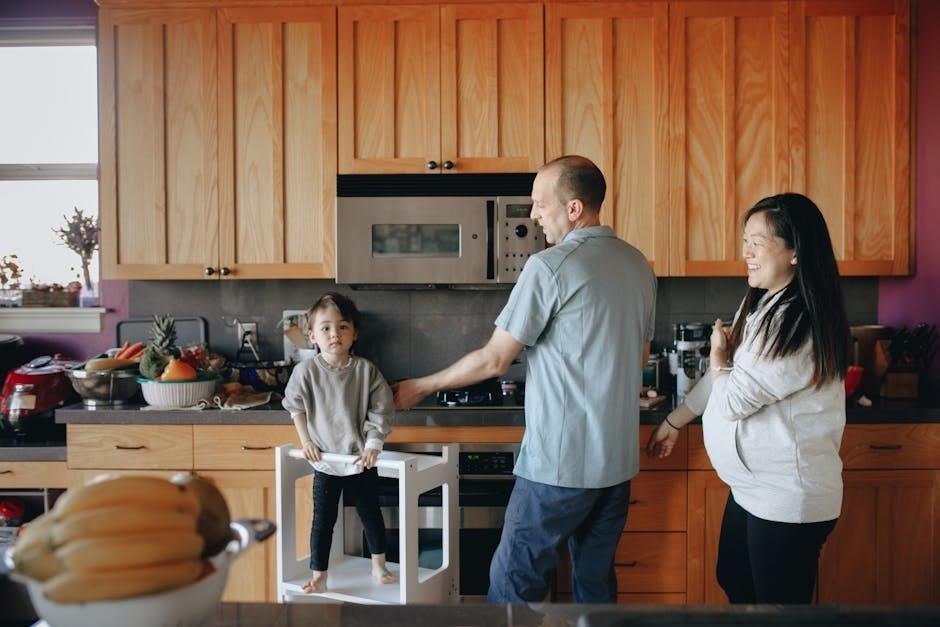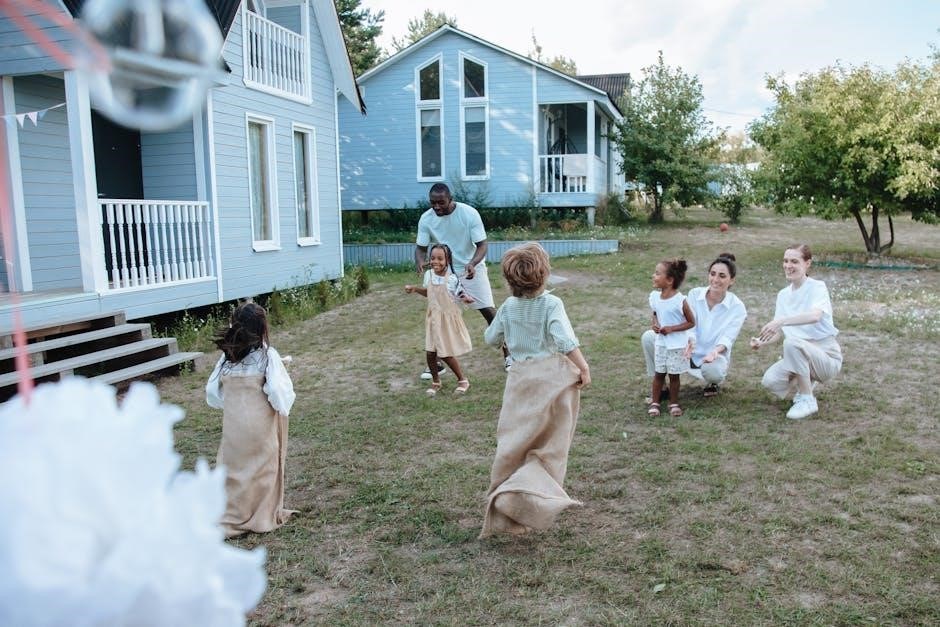Establishing clear house rules fosters mutual respect and harmony when adults live with parents‚ balancing independence with shared responsibilities for a peaceful and organized home environment.
Why House Rules Are Essential for Harmonious Living
House rules are crucial for maintaining balance and respect in shared living spaces. They establish clear boundaries‚ prevent conflicts‚ and ensure accountability‚ fostering a harmonious environment where everyone’s needs and expectations are met. By defining responsibilities and expectations upfront‚ house rules promote mutual understanding and respect‚ creating a foundation for peaceful cohabitation among adults and parents.

Key Principles for Establishing House Rules
Fairness‚ respect‚ and clarity are essential when creating house rules‚ ensuring they are practical and adaptable to maintain harmony and meet the needs of all household members.
Respect and Boundaries
Respect and boundaries are cornerstone principles for harmonious living. Adults and parents must maintain mutual respect‚ knocking before entering personal spaces and avoiding intrusive behavior. Clear boundaries ensure privacy and personal freedom‚ fostering trust and accountability within the household. Respecting individual space helps prevent conflicts and promotes a positive living environment;
Clear Communication and Expectations
Clear communication is vital for maintaining harmony and understanding. Adults and parents should openly discuss expectations‚ responsibilities‚ and boundaries to avoid misunderstandings. Regular family meetings can ensure everyone is aligned and heard. Being approachable about concerns or rule adjustments fosters a collaborative environment‚ promoting accountability and mutual respect. This open dialogue is key to a peaceful and adaptive living arrangement.

Financial Contributions and Responsibilities
Financial contributions are essential for shared living. Adults should pay rent or bills‚ ensuring fairness. Non-compliance may lead to penalties‚ fostering accountability and mutual respect.
Paying Rent or Contributing to Household Expenses
Adults living with parents should contribute financially through rent or bills. This ensures fairness and reduces family burdens. Contributions should be agreed upon‚ with clear terms. Regular payments maintain trust‚ while non-compliance may result in penalties or revised living arrangements. Transparency and accountability are crucial for a harmonious and shared living environment.
Splitting Bills and Shared Costs
Sharing household expenses ensures fairness and reduces financial strain on parents. Bills can be split equally or based on usage‚ with clear agreements on contributions. Regular discussions about expenses help maintain transparency and harmony. Tracking shared costs through joint accounts or apps can simplify management and prevent disputes‚ fostering a collaborative and respectful living environment;
Chore Delineations and Shared Responsibilities
Dividing household chores fairly ensures accountability and maintains a clean‚ organized living space. Assigning tasks based on ability and availability fosters respect and shared responsibility.
Creating a Fair Division of Household Chores
A fair division of chores ensures everyone contributes equally‚ fostering harmony and accountability. Assign tasks based on individual strengths and availability‚ using a rotating schedule or dividing heavy-duty jobs like yard work or deep cleaning. Open communication ensures adjustments can be made to maintain balance and fairness. This approach prevents resentment and promotes teamwork.
Accountability for Personal and Common Spaces
Maintaining accountability for personal and common spaces ensures a harmonious living environment. Each individual is responsible for keeping their room clean and tidy‚ avoiding clutter in shared areas. Respect for shared spaces‚ such as the kitchen and living room‚ is crucial. Cleaning up after meals and keeping common areas organized fosters mutual respect and a comfortable home for everyone.

Privacy and Personal Space
Respecting individual boundaries and personal belongings is crucial. Knocking before entering private spaces and avoiding intrusion into others’ affairs fosters trust and harmony at home.
Respecting Individual Boundaries
Respecting personal space and privacy is essential for harmonious living. Adults and parents should knock before entering private rooms and avoid intruding into each other’s personal affairs. This fosters trust‚ mutual respect‚ and a comfortable living environment. Clear communication about boundaries ensures everyone feels secure and valued in their shared space.
Rules for Entering Personal Rooms or Spaces
Respecting privacy is crucial‚ so knocking before entering personal rooms or spaces is mandatory. Ensure permission is granted before entry to maintain trust and personal boundaries. This rule applies to all household members‚ fostering a respectful and secure living environment where individual privacy is prioritized and upheld consistently.
Guests and Overnight Stays
Advance notice and approval are required for guests or overnight stays to ensure household comfort and respect for shared spaces‚ fostering a considerate living environment.
Guidelines for Having Friends or Partners Over
Adults living with parents should seek permission before inviting friends or partners over. Respect common areas and ensure guests adhere to household rules. Clean up after social gatherings and avoid disrupting daily routines. Guests should be supervised and not interfere with family activities. Overnight stays require advance approval and adherence to specified guidelines to maintain harmony and respect for shared spaces.
Advance Notice and Approval for Overnight Guests
Adults living with parents must provide advance notice and obtain approval before inviting overnight guests. This ensures respect for family privacy and shared spaces. Guests should follow household rules‚ and their stay shouldn’t disrupt daily routines. Frequent overnight visits may require discussions about contributions to household expenses or responsibilities‚ maintaining a balance between comfort and fairness for all.
Noise Levels and Common Courtesies
Respecting quiet hours and minimizing disruptive noise is essential for maintaining a peaceful and considerate living environment for everyone in the household.
Respecting Quiet Hours
Maintaining a peaceful living environment requires adhering to designated quiet hours‚ especially during early mornings‚ late evenings‚ and weekends. Adults should avoid loud noises‚ such as high-volume music or disruptive conversations‚ during these times. Exceptions must be discussed in advance to ensure mutual understanding and respect for all household members’ need for rest and relaxation.
Avoiding Disruptive Behavior
Disruptive behavior‚ such as loud arguments‚ slamming doors‚ or chaotic actions‚ can disturb the household’s tranquility. Adults should strive to maintain a calm and respectful atmosphere‚ avoiding actions that may unsettle others. Being mindful of shared spaces and fostering considerate interactions ensures a harmonious living environment for everyone. This helps prevent unnecessary conflicts and promotes mutual understanding.
Substance Use and Household Safety
Clear rules on substance use‚ such as alcohol and tobacco‚ ensure a safe and respectful environment. Open communication about boundaries and expectations is crucial for harmony.
Rules Regarding Alcohol and Other Substances
Adults living with parents should agree on rules for alcohol and substances. Permission may be required for alcohol use‚ and illegal substances are strictly prohibited. Open communication about boundaries and expectations ensures a safe and respectful environment. Responsible behavior and adherence to these rules are essential for maintaining trust and household harmony.
Ensuring a Safe Living Environment
A safe living environment requires mutual effort. Regular inspections can prevent hazards‚ and residents must comply with safety laws. Securing doors‚ managing electrical appliances‚ and avoiding risky behavior are essential. Open communication about concerns ensures proactive measures. Household safety fosters a secure and comfortable space for all‚ promoting well-being and peace of mind.
Conflict Resolution and Open Dialogue
Open dialogue and regular family meetings help address disagreements constructively. Active listening and respectful communication foster understanding‚ ensuring conflicts are resolved calmly and effectively;
Encouraging Regular Family Meetings
Regular family meetings provide a platform for open communication‚ allowing all household members to discuss responsibilities‚ expectations‚ and concerns. These meetings help resolve conflicts‚ clarify roles‚ and ensure everyone’s voice is heard‚ fostering a harmonious and understanding living environment. Consistent dialogue strengthens relationships and maintains mutual respect‚ ensuring household rules are fair and adaptable to changing needs.
Addressing Disagreements Constructively
Addressing disagreements constructively involves active listening‚ remaining calm‚ and focusing on solutions rather than blame. Open communication helps clarify perspectives‚ reducing misunderstandings. Agreeing on resolution steps fosters mutual respect and maintains harmony. Regular discussions ensure conflicts are addressed promptly‚ preventing escalation and promoting a peaceful living environment for all household members.

Consequences for Violating House Rules
Consequences for breaking house rules may include loss of privileges‚ financial penalties‚ or alternative living arrangements. These measures ensure accountability and maintain household harmony.
Understanding the Implications of Breaking Rules
Breaking house rules can lead to loss of privileges‚ financial penalties‚ or even alternative living arrangements. Parents may revoke freedoms or charge fees for non-compliance. Consequences ensure accountability and maintain household harmony. Understanding these implications fosters mutual respect and encourages adherence to established guidelines‚ balancing independence with shared responsibilities.
Loss of Privileges or Financial Penalties
Breaking house rules may result in losing privileges‚ such as reduced freedom or access to shared amenities. Financial penalties‚ like increased contributions or fees‚ can also be imposed. These consequences ensure accountability and maintain household balance‚ emphasizing the importance of adhering to agreed-upon guidelines while living together. This approach fosters responsibility and mutual respect within the shared living environment.
Maintaining Mutual Respect and Understanding
Sustaining mutual respect and understanding is crucial for harmonious living. Open communication‚ respect for boundaries‚ and teamwork create a supportive environment where trust and accountability thrive.
Building Trust and Accountability
Trust and accountability are foundational to a harmonious living environment. Open communication‚ consistent actions‚ and reliability foster trust. Respecting boundaries and fulfilling responsibilities demonstrate accountability. By maintaining transparency and following agreed-upon rules‚ adults and parents build a relationship rooted in mutual trust and respect‚ fostering a positive and collaborative home atmosphere.
Recognizing the Importance of Teamwork in Shared Living
Teamwork is crucial for a balanced and harmonious living environment. By dividing tasks and sharing responsibilities‚ everyone contributes to the household’s well-being. Collaborative efforts foster mutual respect and unity‚ ensuring that shared living remains positive and sustainable. Teamwork strengthens relationships and creates a sense of accomplishment‚ making it a cornerstone of successful family dynamics.
Adaptability is key to maintaining harmony in shared living. Regularly reviewing and updating house rules ensures they remain relevant and effective‚ fostering a positive environment.
Reviewing and Updating House Rules as Needed
Regularly reviewing house rules ensures they remain fair and effective. Schedule periodic family meetings to discuss changes‚ fostering adaptability as circumstances evolve. Encourage open dialogue to address concerns and update rules collaboratively‚ ensuring they align with everyone’s needs. This flexibility strengthens relationships and maintains a harmonious living environment for all household members.
Fostering a Positive and Respectful Living Environment
Creating a positive home atmosphere involves mutual respect‚ open communication‚ and shared responsibilities. By valuing each person’s contributions and boundaries‚ households can promote understanding and harmony; Encouraging appreciation for teamwork ensures a supportive environment‚ making shared living arrangements beneficial and enjoyable for everyone involved.
